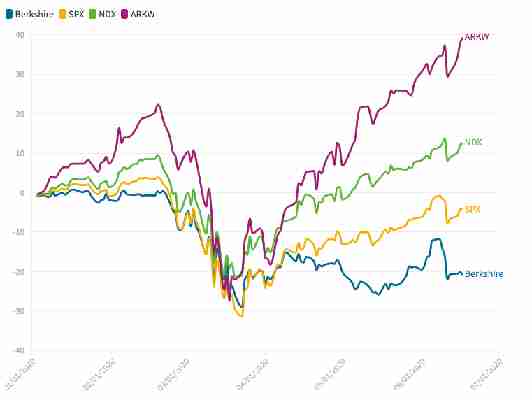New wave tech stocks like Zoom and Tesla have earned investors huge profits already this year, but when it comes to the world’s top actively managed Exchange Traded Funds (ETFs) — a diverse and balanced portfolio of internet stocks has proven the most profitable strategy.

In the race to be crowned 2020’s most-profitable ETF, there’s one actively managed fund slaying the competition: ARK Invest’s Next Generation Internet (ARKW), up almost 40% year-to-date.
For scale, the wider tech sector (as represented by the NASDAQ 100 (NDX)) has risen by a comparatively small 12.5%, and the S&P 500 (SPX), which tracks the top 500 US-listed companies regardless of industry, is actually down 4.4% overall.


Even famed investor Warren Buffett can’t catch a break. The Omaha Oracle might’ve forged a legendary career outperforming the market in a big way, but even Buffett has struggled to turn a profit in 2020.
While not an ETF, stock in Buffett’s Berkshire Hathaway is down more than 20% for the year, weighed by an overt reliance on old-school bank stocks and struggling airlines, the latter of which has since been sold off completely.
Explore ARKW’s winning portfolio (feat. Bitcoin!)
ARKW is a “ next generation internet fund ” working with more than $1.1 billion in assets. For now, the fund spreads its cash across 46 stocks that it expects to “benefit from shifting the bases of technology infrastructure to the cloud,” or “rely or benefit from the increased use of shared technology.”
Mostly, ARKW buys stocks in companies working in areas like cloud computing, ecommerce, big data and artificial intelligence, mobile tech and internet-of-things, social platforms, and blockchain/peer-to-peer systems.
You can explore ARKW’s portfolio using the visualisation below: the bigger the square, the bigger the investment. (NB: If the visualisation doesn’t show, please try reloading this page in your browser’s “Desktop Mode.”)
The top 10 stocks held by ARKW are: electric car maker Tesla (9.81%); fintech incumbent Square (8.46%); entertainment platform Roku (6.36%); online education firm 2U (4.25%); real estate portal Zillow (4.06%); lending marketplace LendingTree (3.37%); Snapchat’s Snap Inc (3.13%); data software crew Splunk (2.97%); cloud computers Pagerduty (2.84%); and social media giant Facebook (2.81%).
Even cooler, ARKW is invested in the world’s most popular cryptocurrency, Bitcoin (kinda). The fund holds $ 24.9 million worth of shares in Grayscale Bitcoin Trust : a security that exposes the holder to Bitcoin’s price movements without actually owning the BTC themselves.
ARKW notably holds more stock in Grayscale Bitcoin Trust than in major players like Apple, Spotify, PayPal, and Adobe. It isn’t exactly the same as holding Bitcoin, but it’s about as close as Wall Street gets to the real thing.
Wait, there’s another fund making serious bank
ARKW’s web-focused portfolio may have faired better than any other “actively managed” ETF analyzed by Hard Fork, but one “passively managed” fund has actually returned more profits for the retail buyer this year: WisdomTree’s Cloud Computing Fund , with $99 million in assets under management.
Passively managed ETFs continuously adjust their portfolios based on how an external index is weighted. For example, QQQ’s portfolio mimics NDX almost identically, allowing retail buyers to invest in the overall growth of NDX, and eliminating the work that comes with constantly buying and selling stock.
WCLD is up more than 41% this year, beating ARKW by a couple of percent. Instead of being adjusted manually, WCLD’s portfolio automatically tracks the BVP Nasdaq Emerging Cloud Index (EMCLOUD). It maps the performance of emerging public companies that provide (you guessed it) cloud computing software.
WCLD works with a comparatively diversified portfolio of more than 50 stocks, and they’re evenly distributed: only Fastly and Zoom Video account for more than 3% of its total holdings. Other notable inclusions are Docusign , Cloudflare, and Datadog.
Apple can sell devices in India because of Trump administration, says Tim Cook
Apple chief exec Tim Cook has revealed the Trump administration helped the company gain approval to sell smartphones in India for the very first time, BusinessInsider reports.

In a television interview, Cook confirmed the White House lobbied with the Indian government to amend laws restricting Apple from selling devices in the country unless it partnered with a local third-party retailer.
“[…] We did not want to do that, we wanted to maintain control over our brand and so forth. But, the [Trump] administration worked on this with the Indian government, and that change has been made […],” Cook told CNBC.
[READ: Apple is considering taking Trump and his immigration ban to court ]
TNW reported last week that Apple would begin online sales in India — the world’s second largest smartphone market — this year, and plans to open its first physical store in the country by 2021.
Cook on his relationship with Trump: jobs are common ground
Apple’s CEO has embraced politicians in a way that the late Steve Jobs largely avoided. The two appeared particularly chummy last November, when Trump toured an Apple factory in the US with Cook during campaign efforts.
This also isn’t the first time Apple has apparently benefited from such close ties with the president. After heavy lobbying from Cook, the Trump administration awarded Apple 10 out of 15 requests for exemption from government tariffs on Chinese-made components, despite Trump having shot down similar requests in the past.
That’s not to say Cook agrees with Trump on all matters. He publicly fought for the Deferred Action for Childhood Arrivals (DACA) immigration policy, attracting accolades for using his corporate gravitas for activism.
Cook told reporters there are indeed differences between himself and Trump, but found they shared common ground on job creation and education — training the workforce for the future.
“I think one of the US’ major challenges is to solve this issue: it’s that as technology speeds over and over again, and jobs are disrupted, and jobs are created, we have to make sure our education is preparing people for the disruption and the creation,” said Cook. “I think if we do that, we can flourish in this environment, but if we don’t, we leave a lot of people behind, and that should be unacceptable for all of us.”
As for Apple’s employees, they don’t really mind that Cook and Trump are buddies. A survey of more than 100 staff found that 82% supported Cook’s engagement of the president in ways that “shape policy in Apple’s favor,” and more than half either strongly agreed or agreed with his participation in the campaign adverts.
These are the 3 least volatile tech stocks paying out high dividends
Dividends allow shareholders to directly benefit from a company’s profits, by paying out part of it on a yearly, quarterly, or monthly basis. For investors seeking reliable income — so-called fixed income — stocks paying out dividends offer a great opportunity, especially in the current ultra-low interest (on other investment vehicles like bonds) environment. In short, dividend investors are less focused on stocks’ depreciation or appreciation in price.

The financial sector, utilities sector, and real estate sector are widely known for their high dividend payouts. REITS, or real estate investment trusts, are even lawfully obliged to pay out a percentage of their profits to their shareholders.
Dividends aren’t as pervasive among public tech companies, which tend to either invest their profits into further growth (research and development, marketing/sales) or to use stock buybacks to beef up their stock price instead. But there are some exceptions, and we’re about to reveal them to you.
Now, we don’t just want to point out tech stocks that offer a high dividend yield, that would be too easy. So we’ve also added the following conditions:
The 5-year average dividend yield must be 2% or higher.
The company’s market cap must be $5 billion or larger.
The stock’s price can’t be lower than it was five years ago.
They must be US companies, traded on either the New York Stock Exchange or the Nasdaq.
Using these criteria, we’ve generated a list of public companies, which we then sorted by their 5-year trading range (an indication for their long-term volatility). In summary, we want to find tech stocks with lower volatility and high dividends. Here are the results:
Verizon (VZ)
Verizon is the second-largest telecom company in the US, with a market capitalization of $224 billion. We’ve taken other telecommunications companies like AT&T and Comcast out of the equation, as they’re more diversified conglomerates with a considerably large stake in media.
By far, Verizon is the least volatile tech stock paying out a high annualized dividend. Its stock price’s 5-year trading range is between $49 and $62. Furthermore, Verizon paid out an average annual dividend yield of 4.5%.
Cisco (CSCO)
Cisco is a globally operating tech company known for its networking hardware, software, and telecommunications equipment. It has a market capitalization of $190 billion.
Cisco is the second least volatile tech stock paying out a high annualized dividend. Its stock price’s 5-year trading range is between $29 and $58, considerably wider than Verizon’s. For the past five years, Cisco paid out an average annual dividend yield of 3%.
Maxim Integrated (MXIM)
A bit lesser known than previous companies, and with a market cap of just $15 billion, Maxim is a so-called semiconductor. The company designs, manufactures, and sells analog and mixed-signal circuits, chips powering smartphones, wearables, and healthcare and factory automation devices, among others.
Maxim is the third least volatile tech stock paying out a high annualized dividend. Its stock price’s 5-year trading range is between $32 and $64, and it pays an average annual dividend yield of 3%.
So there you have it: These three may not be the sexiest, high-flying tech companies around, but they’re offering relative stability for those who like to get ‘paid’ regularly and can’t stomach wild price changes.











